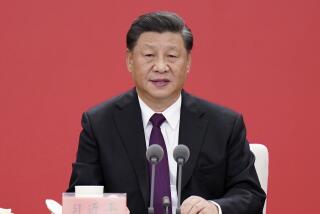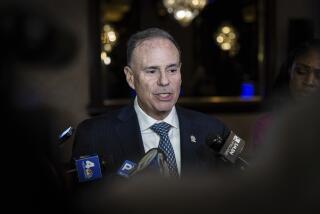The election season that burst into flame
I knew enough at the time to realize that this sort of thing didn’t normally happen on my television. Bill Maher and Michael Moore were getting down on their knees in front of Ralph Nader to beg the candidate not to run for president.
In the last election, in 2000, people might have thought of doing such a thing, but we wouldn’t have seen it enacted on our TV screens. That election was close but not contested, emotionally, not until Florida, at least. This election is not only close and contested, its emotions also have been spilling onto live TV for an astonishing number of months. This has resulted in an extended passion play, during which we have witnessed the best that live TV has to offer. We have seen a senator, Zell Miller, say that he wished he could challenge a talk show host, MSNBC’s Chris Matthews, to a duel. We have seen a venerable anchor, CBS News’ Dan Rather, apologize for airing a report on President George W. Bush’s military service that relied upon apparently forged documents. We have seen a comedian, Jon Stewart, tell two political pundits, Tucker Carlson and Paul Begala, that their incessant, staged bickering amounts to a betrayal of the public trust at a time of great national urgency. He was supposed to be there to plug a book and be funny.
In the midst of all this, more than 160 million people tuned in to the three debates. Television craves all of the emotional components featured in this year’s presidential race -- fear, anxiety, uncertainty; they’re the building blocks of ratings. TV news usually has to fabricate its way there (“What you don’t know about your refrigerator that could kill you”); here, in Bush vs. Kerry, it has been handed a months-long story in which the drama isn’t fake or vicarious, it’s actual.
Maybe that’s why, two weeks ago, I found myself riveted as Al Gore spoke to a group of Georgetown University students on C-SPAN. At 10:30 in the morning. Watching TV, even Al Gore on C-SPAN in a dead news hour, it was possible to feel as though you might witness history, at any moment.
The story had a momentum of its own, you could feel it coming through the TV -- even if you couldn’t always see it. The 24-hour news networks merely had to get out of the way of the race this time around, but instead they presented us with a daily paradox: Instant access canceled out by incessant back-and-forth between the campaigns, with too little traffic control.
Messages came straight from the campaign spinners, who became parodies of themselves. They all looked and sounded alike after a while, mouthing whatever had been worked out in the message meeting, broken up only by pundits. No surprise, then, that seeing the candidates without interference from talking heads felt like such a revelation at the first debate.
The week before last, the news channels were busy throwing several mini-controversies against the wall to see if they would stick. They included Teresa Heinz Kerry apologizing for remarks made to USA Today that the first lady hadn’t had “a real job,” forgetting that Laura Bush had been a librarian and schoolteacher. Heinz Kerry apologized, but the Bush spin-meisters went on the air, using the incident to troll for votes.
Meanwhile, there was the flu vaccine shortage -- was it Bush’s fault or Kerry’s fault?
Pat Robertson, a guest on CNN’s “Paula Zahn Now,” recalled that the president had boasted there wouldn’t be any casualties during the invasion of Iraq. The White House denied that any such statement had been made.
In the waning days of the campaign, the televised spin and counter-spin had already reached a mind-numbing crescendo. On its own, it had become absurd.
“Kerry will accuse Bush of secretly planning a backdoor draft of flu-stricken seniors,” Rob Corddry, correspondent for Comedy Central’s mock news program, “The Daily Show,” reported that week in a bit that nicely summed up the political fever dream. The Bush people, Corddry added, will warn that “Kerry will detonate a bomb in an American city that turns everybody gay.”
Last week, I turned it all off for a while. I turned it off because I found myself trying to figure out why and when that bell sound effect goes off on “Crossfire.” By then I also needed a week off from Wolf and Judy and Brit and Chris.
Then, like any addict, I turned it back on. There was new video of Osama bin Laden. He looked good, was the consensus, wearing a golden robe, saying, “Unlike what Bush says, that we hate freedom, let him tell us why we didn’t attack Sweden, for example.... “
How’s that again? The election had us all beyond anxious, and now Bin Laden was auditioning as a deus ex machina, on my TV, saying the nation’s security was not in the hands of either Kerry or Bush, but in ourselves?
“This is the only videotape I can remember with no gun in the frame,” Peter Bergen, CNN’s terrorism analyst, said Sunday on “Late Edition With Wolf Blitzer.” Bin Laden, he added, “presented himself as a statesman, in a Halloween parody of an Oval Office address.”
The Bin Laden tape did feel like the last surreal twist in this televised drama. The archvillain returns, the Friday before Nov. 2, saying the election doesn’t matter. He uses provocative phrases like “Bush the father” and appears to refer to the video from “Fahrenheit 9/11” in which the president is seen continuing to read with schoolchildren after learning a plane had gone into the World Trade Center.
The story, everyone is saying, won’t even end tonight. Onstage will come the lawyers, the election officials, maybe some new kinds of experts. How, I’m thinking with that by-now-familiar combination of dread and wonder, do you make an election recount into exciting TV?
More to Read
Get the L.A. Times Politics newsletter
Deeply reported insights into legislation, politics and policy from Sacramento, Washington and beyond. In your inbox three times per week.
You may occasionally receive promotional content from the Los Angeles Times.






